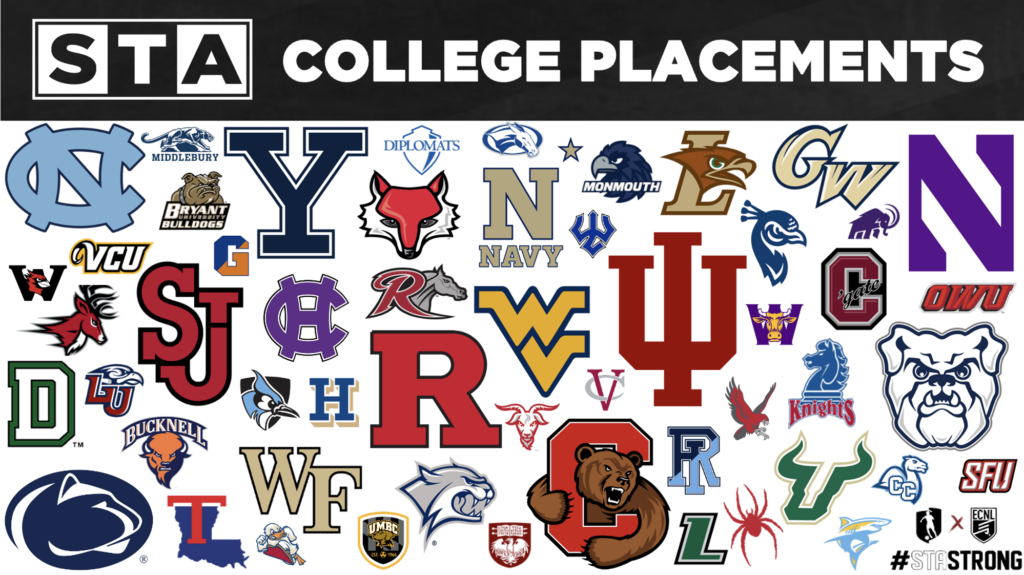
STA is committed to doing all we can to support our players and parents as they navigate the complexities of the College Recruitment process. Our track record is exemplary and is a testament to the investment our staff display throughout the recruitment cycles.
With our full-time staffing model, the relationships our Directors and staff have built with schools within the industry means we are finely placed to regularly communicate with coaches and will monitor and guide the progress of our players through every step of their process.
Couple this with the visibility and exposure to some of the Nation’s top schools that our players and teams receive through their participation in the country’s most competitive College Showcase events, alongside our provision of a College Fit Finder account for each High School player within our club, we believe we are a great option for any player seeking to play in the NCAA.
In-house, each year we also commit to hosting a one-day College ID day for 50 of our Male and Female players where we are visited by dozens of schools from every level from around the Northeast. Schools have included Rutgers, Villanova, NJIT, FDU, Saint Peters, Binghamton, Bucknell, Marist, Wesleyan, Gettysburg, Muhlenburg, Stevens, Stevenson, Montclair State and Rowan.
We also are generously visited by a number of the region’s top coaches who provide an insight in to the College Pathway/Recruitment process as part of a panel Q & A session for our players and parents, while our Coaching Directors also host additional education nights surrounding the application process.
Schools that have supported us have included: Rutgers, Indiana, NJIT, FDU, Rowan University, Drew University and DeSales, and we thank them for their time.
One of the things we are most proud of about our College Pathway is the success our student athletes go on to have at the next level.
Amongst our ranks we have NCAA National Champions, NCAA National Finalists, NCAA League and Tournament Champions, NCAA All-Americans, NCAA Players of the Year, NCAA Team of the Year, Team of the Week and Player of the Week recipients.
#NEXTLEVEL
2024 HIGHLIGHTS:
Emerson Elgin – NCAA Division I National Champion, University of North Carolina
Andrew Tremante – NCAA Division III National Champion, Amherst College
2023 HIGHLIGHTS:
Luciana Rodrigues – MAC Freedom Rookie of the Year, Stevens Institute of Technology
NCAA Division III Men’s All-Region –
First Team: PJ Ryan, Bruno Andino, Justin Cross, Owen Murphy & Anthony Pinto
Second Team: Drew Weaver & Luca Campbell
Third Team: Chris Giglio, Shane Keenan & Jaden Longdon
NCAA Division III Women’s All-Region –
First Team: Mikaela Timmermans
Second Team: Jadyn Mapura & Haley Scaff
Third Team: Morgan O’Neil
2022 HIGHLIGHTS:
Ryan Friedberg – Ivy League Rookie of the Year & Rookie Team of the Year, Cornell University
Aoi Kataoka – A10 Rookie Team of the Year, George Washington University
Emerson Elgin – NCAA Division I National Finalist, University of North Carolina
David Schuster – NCAA Division III National Champion, University of Chicago
Mackenzie Gress – B1G Tournament Champion, Penn State






























As you review the information there are four things to keep in mind:
To understand when to get started, you need to work backwards. Coaches build their annual recruiting process around the official signing date, February 1st (of your Senior year).
With the above in mind, it is recommended that your child begin the process during the;
BOYS – fall of their sophomore year of high school.
GIRLS – spring of their freshman year of high school.
The process starts earlier for female players because schools (DI especially) look to get verbal commitments and their future classes locked in a few years in advance.
Note: NCAA regulations permit coaches to respond to prospective student-athlete inquiries, but the coaches cannot initiate contact until [September 1 of your child’s Junior year.]
You never get a second chance to make a first impression! Make an effort to make a good impression on your teachers as you begin a new phase in your life.
Realize that your grades from this year matter! Colleges will see the grades you receive in ALL four years of high school. Start off strong! Get involved in extracurricular activities in and outside of school.
Sophomore year can be a challenging one. Remain focused, stay on track academically and keep up your grades.
This is an important year for your academic record. Make it count!!
Don’t let down in your class work. Finish strong. It is important you stay focused, organized, and manage your time so that your hard work will pay off.
The players needs to make a list of around 20 schools (e.g 10 academically and 10 athletically) and this list should have some schools that are unrealistic, realistic and easily achievable. When making this list you need to also think about what kind/type of school you want to attend;
Location
Area
Climate
Size
Type
Culture
Cost
Academic Offering
Soccer program/coach
Soccer team needs/playing time potential
Do your research. Take your time. Go and visit different types of schools to figure out what you like.
Coaches expect players to have done their research on both the school and the soccer program. Coaches do not want to be in discussions with a player only to find out, for example, that the school doesn’t offer what the player wants to study.
Once you and your child have developed a list of schools, your child needs to set-up a time to meet with your coach, DOC or the STA College Director. At the meeting, the player and staff will review the list of schools and discuss appropriate division of play for the player. The coach’s role at this point is to help guide your child to realistically achieve their goal to play soccer in college. The college coaches count on the club coaches to be realistic about the division where a player can have the biggest impact for a team be it DI, DII or DIII.
The next step is to develop an email to introduce yourself to the college coaches from your list. For more information on emailing college coaches go back and click on the templates & docs tab.
In this email you can include a soccer resume and your upcoming game and showcase tournament schedule.
The most important things to remember are; it must come from the player not the parent, be personal and specific to the school (be careful when copy and pasting), and make sure your details (email, team, jersey number and graduation year) are correct and included.
Once the letter, resume and team schedule has been sent, now what…
The majority of surveyed coaches encourage follow-up while some indicated if they are interested, they will follow-up. Due to NCAA rules this may be through your club coach or by inviting you to a ID clinic of camp. Your follow up email should be before and after every showcase tournament you compete in. This is to remind them, ask if they are attending and to send them your game schedule for that tournament. Then, after the tournament, email them to see if they came or to thank them for coming. Give them a little recap of your highlights/successes.
It is helpful to understand that some schools will receive hundreds of emails a week. Patience and persistence is key.
The majority of schools host camps and clinics throughout the year. The camps serve a couple of purposes for the schools and their soccer programs: source of income for the program, recruiting and awareness building for the school.
Attending the camps of the schools your child has on their list is not mandatory, but it can be very helpful. For your child, it gives them an opportunity to experience the school and to interact with the coaching staff. For the coaches, it is an opportunity to better assess a player’s skills, attitude and team fit. According to the coaches surveyed, many actually recruit players who they saw at camp.
Something else to keep in mind about attending a camp is that coaches from other schools often work at the camp for their own recruiting purposes. So, your child is exposed to multiple opportunities. And if your child attends a camp(s), they need to make sure that at some point during camp, they introduce themselves to the coaches. During registration/arrival and departure, coaches are inundated by parents trying to make an impression on behalf of their child but it is the player that the coaches will remember.
An unofficial visit is any visit to a school that is paid for by the player or parents. There are no limitations on when you can visit or how many visits can be made. The only expense a school may offer to pay is for three complimentary tickets to a school’s sporting event.
There are more regulations pertaining to an official visit. Briefly, an official visit occurs at the invitation of a coach and is paid for by the school. Please go to the NCAA website for the specifics on unofficial and official visits.
A helpful tip for official visits to DI schools:
The player will be asked to provide the coaches with transcripts and test scores as well as confirm registration with the Eligibility Center.
During a visit, how can the player best represent themselves
Players need to be mindful that coaches will be watching – you never know when and they see more than a player might think.
Coaches were asked besides skills, what are they looking for when they watch a player;
College Coaches have strict restrictions about who and when they can make initial contact with players, therefore, you should be introducing yourself to coaches from colleges you are interested in attending. NCAA coaches cannot initiate conversations before a player’s junior year in High School, but they can respond if you contact them first.
Email is a great way to introduce yourself and allows more people to know who you are. Your email should let the coach know that you have researched their program, have the potential to be a college athlete, and give them a schedule of where they can watch you.
Coaches are looking for emails to include the following:
Player’s name
Name of club team
Name of high school
GPA
Graduation date
Projected major
Upcoming schedule (tournaments, academy games, etc.)
Coach references with contact information
Resume (separate document)
The resume should include:
Note: Photos are not necessary and you want to make sure that the resume can be easily emailed.